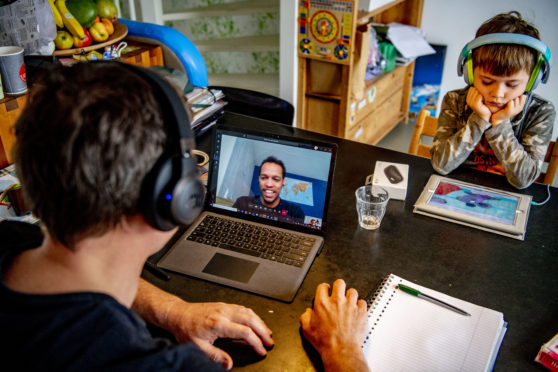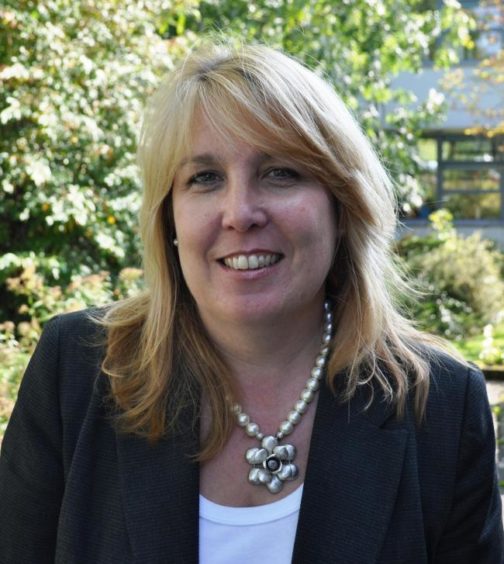
Every pupil in Scotland must be given a laptop or tablet and internet access by the time schools reopen, say experts.
Children return to school on August 11 with a new blended learning model that will split teaching between classrooms and homes. But there is growing concern that thousands of pupils will struggle to access the digitl kit necessary to allow them to learn from home.
It emerged on Friday that, because of social distancing, pupils in some regions may only attend school one or two days a week, or one week in three, amid growing calls to redeploy empty public buildings or create temporary structures to allow children to get more face-to-face teaching.
Deputy First Minister John Swinney last month pledged £9 million for 25,000 laptops for the most disadvantaged pupils but the Scottish Government told the Sunday Post none of those laptops had been given out while it is not known how many of Scotland’s 700,000 pupils does not have internet access.
Scottish ministers are working with councils to calculate how many children cannot access the internet, but many local authorities are still in the process of asking parents. While some councils have issued most pupils with laptops, others have given only a few hundred to the most in need.
The call to equip pupils with computers comes amid mounting evidence that swathes of Scottish children have received little proper education since schools closed at the end of March.
Councils are in the process of creating new timetables that stagger attendance in classrooms. In Glasgow there are plans to have children in school for two days a week while in Edinburgh and Aberdeen pupils could attend one week in three, with the majority of learning done at home.
Larry Flanagan, general secretary of the EIS teaching union, called for laptops for all pupils but warned that having children attend only part-time would harm their learning. He said: “If a child is in school two days a week instead of five, that is a deficit. One of the barriers to home learning is a lack of access to the internet and laptops. That has to be addressed before August. You can’t push this two years down the line because tens of thousands of children will be permanently scarred by the experience.
“We need to see a major investment in education to address the impact of Covid-19.”
Former First Minister Jack McConnell, an ex Education Secretary and teacher, said: “The £9m for laptops and tablets should have been spent weeks ago and these machines should have been in the hands of children during lockdown, not after it.”
Lord McConnell said facilities needed to be found so children could be taught properly. He added: “The best online learning is in a room with an adult or teacher, not in a cramped flat. We need to get Scotland’s children back into organised learning environments, safely spaced out with adult supervision and with contact with their classmates.”
John Dickie, director of the Child Poverty Action Group, insisted every child should have a laptop and internet access by August. He said: “We need a clear commitment that absolutely no child in Scotland will be left without the digital devices, connectivity and support they need.”
Schools can use a variety of online options to ensure children are learning during lockdown. While pupils in some areas are able to join live tutorials, others watch lessons recorded by their teacher. But some parents saytheir children have had no face-to-face contact with teachers since lockdown began.
Education Scotland, the government agency responsible for supporting learning, also delivers teaching materials using an online platform called Glow. But the most up-to-date figures show that, in April, only half of Scotland’s pupils logged in.
The Sunday Post contacted all 32 councils in Scotland to ask what action was being taken to provide pupils with access to online learning.
Scottish Borders Council has issued all 6,000 secondary pupils with iPads and has plans to give iPads to 3,700 pupils in primaries 5, 6 and 7 in a £16m investment over 10 years.
In the Highlands, 22,000 Chromebooks have been handed out and in Edinburgh 21,000 devices issued.
Some cash-strapped councils are relying on donations. In Inverclyde, one of the poorest regions in the country, just over 100 laptops have been paid for by charity handouts. A plan to allocate £100,000 for further 250 laptops goes before councillors this week.
Glasgow City Council, which oversees many of the country’s most deprived areas, said education chiefs were still waiting for details about the laptop rollout.
The Scottish Government said: “We are investing £9m for 25,000 laptops – with internet access provided – for disadvantaged children to support learning outside school. We are working with local authorities to determine how many more devices will be needed and how best to deliver them in the next phase of our £30m commitment to support digital inclusion.”
‘Our digital learning is unique and it is working’: by Tracey Logan, Chief Executive of Scottish Borders Council

Our young people are in a unique position. Through our Inspire Learning programme, every secondary school pupil in the Scottish Borders is in possession of a managed iPad, and a suite of apps and tools to ensure they are learning at home.
Their teachers also have iPads, allowing them to deliver the curriculum from home. It means they can interact directly with young people, especially our more vulnerable learners. Children are able to receive content and assignments from teachers, access support materials such as videos created by their teachers and have the ability to join classes live online via Microsoft Teams. Parents can also see tasks set via an app called Show My Homework. Feedback can be written, video or spoken.
The programme is an investment of £16 million over 10 years. Our stats show 96% of our pupils are successfully engaging with Inspire Learning at home. Teacher usage is at a similar level.
We believe we are currently the only council in the country delivering this type of digital learning at home in such a comprehensive way. And now we’re getting ready to introduce the programme to all children in primary 5-7.
We’re happy to share our experiences with other councils and encourage them to get in touch.

Enjoy the convenience of having The Sunday Post delivered as a digital ePaper straight to your smartphone, tablet or computer.
Subscribe for only £5.49 a month and enjoy all the benefits of the printed paper as a digital replica.
Subscribe